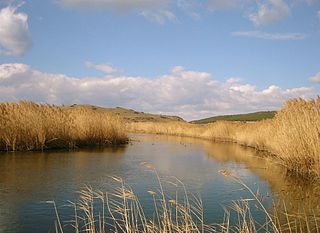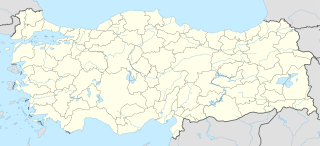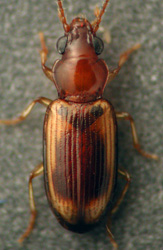
James Wood-Mason was an English zoologist. He was the director of the Indian Museum at Calcutta, after John Anderson. He collected marine animals and lepidoptera, but is best known for his work on two other groups of insects, phasmids and mantids.

Empusidae is a family of plant-mimicking mantises, consisting of 10 genera, holding almost 30 species. Unlike many other mantis families, the Empusidae are a monophyletic lineage. Empusidae mantises are ambush predators, with mouthparts adapted to feeding on other insects and small animals. The majority of Empusidae species are distributed throughout Africa, but they are also found in Southeast Asia and in the southern parts of Europe.
Gongylus or Gongylos (γογγύλος) may refer to:

Sibylla pretiosa, commonly known as the cryptic mantis, is a species of mantis found in southern Africa. They have a long and thin prothorax. The distinctively ornamented species has projections on the head, prothorax, and four femora. They live on tree bark in woodlands.

Chalcides bedriagai, commonly known as Bedriaga's skink, is a species of lizard endemic to the Iberian Peninsula. It usually lives in sandy areas with sparse vegetation and good ground cover. It can also live in open woodland and burrow into loose soil. Females of the species give birth to live young. These skinks are active during day and dusk, and they are very timid. They reach about 16 cm (6.3 in) in total length and have five fingers on each foot. They prey on insects, spiders, slugs and woodlice.

Gongylus is a genus of praying mantises in the family Empusidae. Characterized by extremely slender limbs with large appendages, at least one species is kept as a pet by hobbyists. Males of the species are capable of flight.

Myrina was one of the Aeolian cities on the western coast of Mysia, about 40 stadia to the southwest of Gryneion. The former bishopric is now a Latin Catholic titular see.
Phytoscutus is a genus of mites in the family Phytoseiidae.
Phytoscutus bakeri is a species of mite in the family Phytoseiidae.
Phytoscutus glomus is a species of mite in the family Phytoseiidae.
Phytoscutus salebrosus is a species of mite in the family Phytoseiidae.
Phytoscutus sexpilis is a species of mite in the family Phytoseiidae.
Phytoscutus vaughni is a species of mite in the family Phytoseiidae.
Phytoscutus wiesei is a species of mite in the family Phytoseiidae.
Phytoscutus wongsirii is a species of mite in the family Phytoseiidae.

Gryneium or Gryneion, also Grynium or Grynion (Γρύνιον), Grynia or Gryneia (Γρύνεια) and Grynoi (Γρῦνοι), was a city of ancient Aeolis. It was located 40 stadia from Myrina and 70 from Elaea. In early times it was independent, one of the 12 important cities of Aeolis, but afterwards became subject to Myrina. It contained a sanctuary of Apollo with an ancient oracle and a splendid temple of white marble. Pausanias wrote that at Gryneium, where there was an amazing grove of Apollo, with cultivated trees, and all those which, although they bear no fruit, are pleasing to smell or look upon.

Pericompsus is a genus of beetles in the family Carabidae, containing the following species:
Emoia baudini, also known commonly as Baudin's emo skink, Baudin's skink, and the Great Bight cool-skink, is a species of lizard in the family Scincidae. The species is native to New Guinea, Maluku, and Sulawesi.
Gongylus pauperatus is an praying mantis in the family Empusidae. Its generic name Gongylus means "roundish" in Greek.







